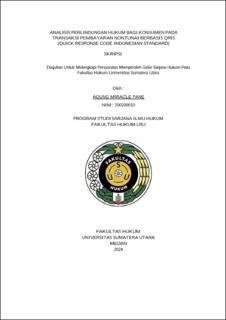| dc.description.abstract | QRIS (Quick Response Code Indonesian Standard) is the National QR code standard
used to provide payments through QR codes in Indonesia with the aim of making domestic
payment transactions through QR codes faster, easier, and safer. The implementation of QRIS
is primarily guided by the Governor's Board Member Regulation (PADG) Number
21/18/PADG/2019 on the Implementation of the National Quick Response Code Standard.
Nevertheless, the implementation of QRIS is not without obstacles, hindrances, and threats of
sabotage crimes that can harm the community. The problem formulation in this thesis is as
follows: What is the mechanism of using transactions with QRIS; What is the legal relationship
between consumers using QRIS and sellers and related parties in QRIS transactions; How is
legal protection for consumers in non-cash transactions based on QRIS.
The type of research used in the writing of this thesis is normative juridical research
using primary and secondary data, namely with a statutory approach and a conceptual
approach. The data collection techniques in this thesis writing use library research and field
research, and the data are processed and analyzed qualitatively.
The results of this research indicate that the Regulation of the Board of Governors of
Bank Indonesia Number 21/18/PADG/2019 on the Implementation of the National Standard
Quick Response Code for Payments has included implementation mechanisms up to legal
protection for parties involved in QRIS. Issues that arise regarding the implementation of QRIS
include fraud, lack of public understanding of QRIS, and cybercrime. To protect consumer
rights, there is legal protection in the form of preventive legal protection and repressive legal
protection. Preventive legal protection includes direct supervision by Bank Indonesia and
socialization of QRIS usage to the public. Repressive legal protection is regulated in applicable
laws and regulations such as PADG 2019, the ITE Law, the Consumer Protection Law, and the
PBI on Electronic Money, which impose sanctions for any violations of QRIS usage.
Additionally, there is a mechanism for resolving QRIS disputes, both through litigation and
non-litigation channels. | en_US |


